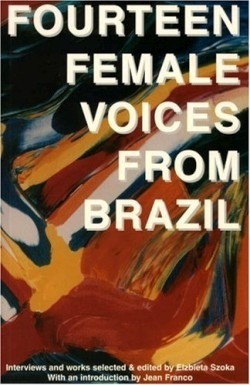Fourteen Female Voices From Brazil
Interviews and Works
“I started ‘writing’ before I knew how to write” explains the first author in this anthology, “I began my apprenticeship telling and hearing stories.” What follows is a “chorus of female voices,” in keeping with an oral tradition of a largely illiterate nation, featuring works and personal insights about the female experience in Brazil.
This collection of short stories, plays, and poetry expresses the gender alienation of women in Brazil’s traditional patriarchal society, particularly those following the unconventional path of the female writer. The works were selected and edited by Szoka, a Columbia University professor, who prefaces each text with a short biographical sketch and interview with its author exploring themes such as the female writer’s journey, the family, globalisation, spirituality, and politics.
Solitude and tragedy underlie each text. The title of Sonia Coutinho’s story “Summer in Rio” belies the true story of a sad woman, spied on by her neighbour, who lives and dies alone. In Conceicao Evarito’s tale, the young and vibrant Ana Davenga is showered with bullets while sleeping peacefully with her lover, meeting a tragic end that seems almost inevitable against a backdrop of crime and poverty.
Freedom is the socio-political endgame. Jandirea Martini describes her early years of theatre: “censorship was so strict that everything was done with metaphors. Words like ‘strike,’ ‘workers,’ etc., couldn’t appear in any script.” Domestic oppression is portrayed, though not overcome, in “The Orchid at the Exhibition” where Astrid Cabral uses the cultured flower as a metaphor for the trophy wife in a beautiful yet disturbing short story.
Brazil’s profound social divisions complicate gender discrimination. When asked what it means to be a woman in Brazil, Conceicao Evaristo replies, “to answer your question, a person needs to think about, ‘What does it mean to be a wealthy woman in Brazil? A poor woman? A black woman? Or an Indian woman?’”
Each writer has her own distinguishing style, though all possess a rich sense of imagination and the inner world. In Esmeralda Ribeiro’s “In Search of a Black Butterfly” a telephone operator overhears a strange conversation in which a woman tells her friend that a black butterfly flew out of her uterus.
From a nation of significant cultural, social, and racial diversity, Szoka uses the female experience to present a selection of works that is cohesive despite obvious differences. Szoka may be defining a new literary movement of Brazilian women; at the very least, she gives some recognition to a group of unheard literary voices.
Disclosure: This article is not an endorsement, but a review. The publisher of this book provided free copies of the book to have their book reviewed by a professional reviewer. No fee was paid by the publisher for this review. Foreword Reviews only recommends books that we love. Foreword Magazine, Inc. is disclosing this in accordance with the Federal Trade Commission’s 16 CFR, Part 255.

